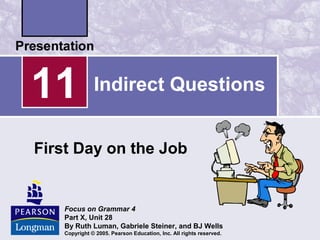
New Employee's Many Questions
- 1. Indirect Questions First Day on the Job 11 Focus on Grammar 4 Part X, Unit 28 By Ruth Luman, Gabriele Steiner, and BJ Wells Copyright © 2005. Pearson Education, Inc. All rights reserved.
- 2. I think he did okay, but he sure asked a lot of questions. I think he did okay, but he sure asked a lot of questions. Well…Well… How did the new employee do on his first day? How did the new employee do on his first day? Oh? What kinds of questions did he ask you? Oh? What kinds of questions did he ask you? Too Many QuestionsToo Many Questions
- 3. He asked me if he could get a bigger office. He asked me if he could get a bigger office. He also asked me why the previous person had left. He also asked me why the previous person had left. He asked me who fixed the computers. He asked me who fixed the computers. “Who fixes the computers?”“Can I get a bigger office?” “Why did the previous person leave?” Indirect QuestionsIndirect Questions
- 4. The new guy asked whether the boss liked practical jokes. The new guy asked whether the boss liked practical jokes. The new guy asked if we had any more chocolate donuts. The new guy asked if we had any more chocolate donuts. Indirect Yes / No Questions 1Indirect Yes / No Questions 1 Use if or whether in indirect yes/no questions. “Do you have any more chocolate donuts?” “Does the boss like practical jokes?”
- 5. Indirect Yes / No Questions 2Indirect Yes / No Questions 2 Whether is more formal than if. We often use whether or not to report yes/no questions. The new guy asked whether or not he could take a break. The new guy asked whether or not he could take a break. “Can I take a break?”
- 6. Practice 1Practice 1 1. “Does the company provide a car?” They asked… 2. “Can I have a company credit card?” She asked… 3. “Did he order a new computer?” I asked… Change the direct questions into indirect questions. Use if, whether, or whether or not. They asked if the company provided a car. She asked whether she could get a company credit card. I asked whether or not he had ordered a new computer. “Will I get a raise?” He asked… Example: He asked if he would get a raise. He asked whether he would get a raise. He asked whether or not he would get a raise.
- 7. The new guy asked when the next office party was. The new guy asked when the next office party was. He also asked how many copies he could make. He also asked how many copies he could make. “How many copies can I make?” Wh- Questions 1Wh- Questions 1 Use question words in indirect wh- questions. “When is the next office party?”
- 8. Word Order 1Word Order 1 Use statement word order (subject + verb), not question word order, for indirect yes/no questions. “Can you turn off the fax machine?” He asked me if I could turn off the fax machine. He asked me if I could turn off the fax machine.
- 9. Word Order 2Word Order 2 Use statement word order (subject + verb), not question word order, for indirect wh- questions about the predicate (usually the last part of the sentence). “Why do the meetings last so long?” He asked why the meetings lasted so long. He asked why the meetings lasted so long.
- 10. Word Order 3Word Order 3 Use statement word order (subject + verb), not question word order, for indirect wh- questions about the subject (usually the first part of the sentence). “Who made the coffee?” He asked who made the coffee.He asked who made the coffee. SubjectSubject
- 11. Be Careful!Be Careful! He asked what was the dress code. He asked what was the dress code. If a direct question about the subject has the form question word + be + noun, then the indirect question has the form question word + noun + be. “What is the dress code?” the dress code was.
- 12. He asked me do I have any new video games. He asked me do I have any new video games.any new video games. if I had AuxiliariesAuxiliaries In indirect questions, do not use the auxiliary do, does, or did. “Do you have any new video games?”
- 13. He asked me if I could wake him up in an hour He asked me if I could wake him up in an hour? PunctuationPunctuation In indirect questions, do not end with a question mark (end with a period). “Could you wake me up in an hour?” . ?
- 14. Practice 2Practice 2 1. “What’s the name of the company?” They asked… 2. “How many people work for the company?” We asked… 3. “How long has the boss worked in the office?” I asked… Change the direct questions into indirect questions. They asked what the name of the company was. We asked how many people worked for the company. I asked how long the boss had worked in the office. “Where is my office?” She asked… Example: She asked where her office was.
- 15. Copyright © 2006 Pearson Education and its licensors. All rights reserved. ReferencesReferences